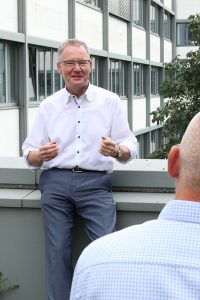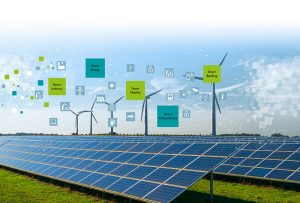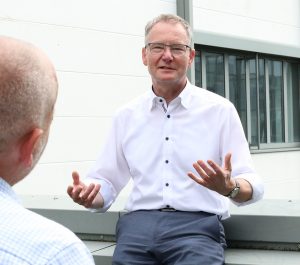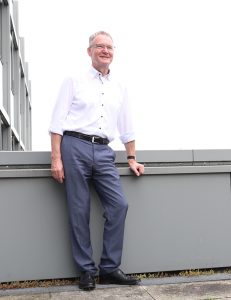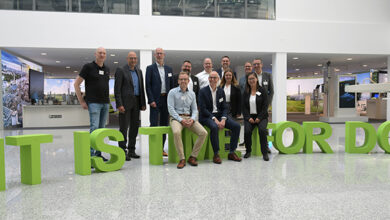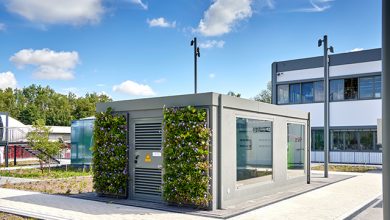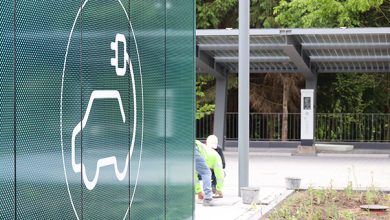With the mission statement of the All Electric Society, Phoenix Contact describes its strategic orientation for the next decade. Roland Bent, CTO and member of the management board of Phoenix Contact, explains how much more than just a slogan resonates in these three words.
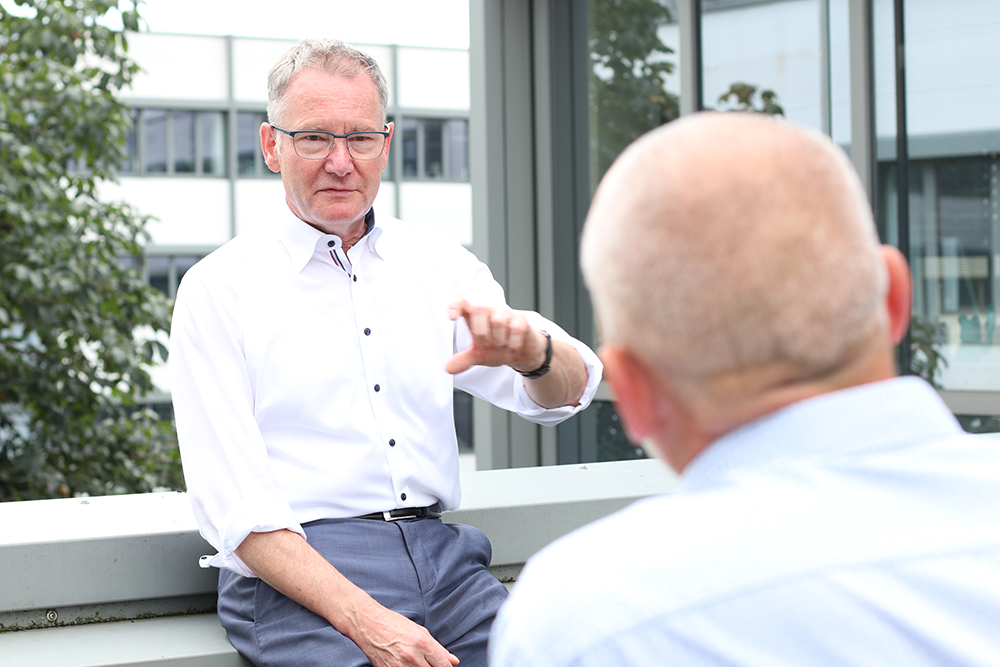
Roland Bent is one of the formative personalities of the last decades at Phoenix Contact. A graduate in electrical engineering, he has been working for the Blomberg-based company since 1984 and has been a member of the management board since 2001. In addition to marketing and product development, he is responsible for innovation and technology management. He is also in charge of Corporate Technology & Value Chain, Toolmaking and Metal Parts Production, Quality Standards & Complaint Management and the international research and development centers.
UPDATE: Mr. Bent, a completely electric company – what is behind this vision and what was the reason to make it the mission statement for the next ten years of Phoenix Contact?
The All Electric Society describes a future in which regeneratively generated electrical energy as the primary form of energy is available worldwide in sufficient quantities and completely economically.
There were several reasons why we made this vision our guiding principle. On the one hand, of course, a proverbial new decade in which we have started. And not only on the calendar, but also with a new management team. And in the first half of this decade, 2023, Phoenix Contact will be 100 years old. But these are just the basic conditions that fit. Much more important to us were the concrete technological and social changes that we all face together. What will our company be like in the coming decades? What do we stand for? What external impulses do we take up and how do they influence our actions?
UPDATE: You anticipate the questions. What are the impulses that lead to the mission statement of the All Electric Society?
Carbon dioxide, the use of fossil fuels, climate change – the relevance of this global challenge can no longer be ignored. How we deal with it – that will be the responsibility of the whole of humanity, but it will also affect us as a company. The trend has been clear for a long time, but in the meantime concrete measures to combat climate change must be incorporated into our business activities.
Climate change will determine our time. This is a global commitment, manifested in the Paris Climate Change Convention. And it has long since also been expressed in economic terms, at the latest since the Commitment of Larry Fink, the boss of BlackRock, one of the largest financial investors, who will only invest in sustainable technologies with his huge fund. This attitude leads to dramatic changes.
UPDATE: What exactly does the term All Electric Society mean?
Coupled with the question of how clean energy can be made available in sufficient quantities is the issue of the growing world population. By 2050, we expect the global energy demand to increase by 50 percent. At the same time, 850 million people today already have no access to any form of electricity at all. The hunger for energy will increase dramatically. And the solution to this dilemma cannot lie in renunciation alone, i.e. saving energy. It must and can only be done technologically, only with new innovations.
Now we come into play as technology leaders, because technology is not the problem, but will be part of the solution. Digitization is one of the keys to solving the problems. We are firmly convinced of this.
UPDATE: Just the digitalization? Phoenix Contact sees itself as the “Digital Industrial Company”. But aren’t our “analog” technologies also indispensable when it comes to the All Electric Society?
The All Electric Society builds on comprehensive electrification, networking and automation. These are all core competencies of our company, based on our DNA of connection technology, electronics in short, connectivity. Of course, these remain our basis, there is no question about that. But in combination with our ever-increasing competencies in digitalization, they become a powerful tool for solving tasks.
An example from our current production: We digitize control cabinets as soon as they are created, working with a digital twin. In this way, we drastically simplify the processes for our customers from planning to assembly. In this way, knowledge and products of the analog world, i.e. the very classical terminal technology, merge with digital technology and create completely new possibilities.
UPDATE: How sensitive is the commitment to the All Electric Society with regard to political neutrality, to which Phoenix Contact actually feels committed? Isn’t it unusual for our company to take such a socio-political stand when populists vehemently deny climate change?
First of all, we follow the scientific facts and not the political opinions. We will not start to missionize. We will synchronize with the facts, and these have been adopted by 185 states at the latest with the Paris Agreement on Climate Protection. To put it briefly: Climate protection is the new norm. Climate change and the need to combat it is a fact that is reflected in political and economic measures worldwide. We must decarbonize our economy. And we share this point of view, and we are right to do so. The pursuit of energy will continue to be a central task for the world’s population in the future. But clean energy, i.e. energy from renewable sources, is still a rare commodity. But this is changing in leaps and bounds. And this demand will be unstoppable and will become one of the biggest economic drivers, that is a fact.
UPDATE: Which technologies will be decisive?
The starting point is the energy of the sun, which, in the form of radiation, wind and water, will be the driving force behind the All Electric Society, because it can be used to generate and use almost unlimited amounts of electrical energy. However, in order to have the fluctuating energy production of natural resources continuously available, we need the possibility to store the generated energy and transport it over longer distances. Power-to-x plays a central role here, i.e. the conversion of electrical energy into gaseous or liquid energy carriers, such as hydrogen. This will be a central factor on the road to the All Electric Society.
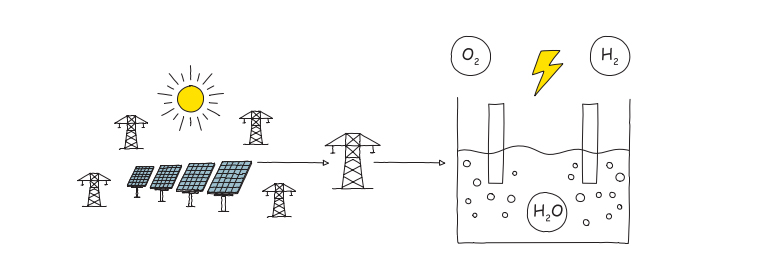
The aim will be to make renewable energy even more cost-effective. However, it can already be seen today that one kilowatt hour can be four to five cents per kilowatt hour when generated using solar energy, which is in the same order of magnitude as when generated on the basis of coal. In addition, however, one ton of CO2, extrapolated, causes damage of around 180 euros. This corresponds to an additional 15 cents/kWh for coal-based electricity. So far, these are not included in the producer prices, because these costs are borne by the community.
But we must make renewable energies even more economical and use them more effectively. We need economies of scale that bring down costs. This can only be achieved through a holistic approach from the generation to the consumption of energy – the sector coupling.
UPDATE: What is hidden behind this term?
If we want to implement renewable energy economically, we need improved energy efficiency across the entire value chain, i.e. from production, transmission and supply to consumption, and this in all energy-producing and energy-consuming areas of life and the economy.
Hitherto, these areas, the sectors, have been considered separately. But when we comprehensively electrify the sectors, network them with each other and automate them holistically, then we speak of sector coupling.
As already mentioned, these are the core competencies of Phoenix Contact, and this is where we are technologically at home. We therefore outline our active task as “Empowering the All Electric Society”, i.e. making this vision of the future possible. We do not build solar systems, we do not have any power grids, energy storage systems or Power to X systems. We want to enable our customers to use our products and solutions to network sectors both electrically and in terms of data technology in order to create a smart, intelligent control system for the entire chain.

UPDATE: How do we integrate our customers from the process and chemical industries as well as the raw material extraction of traditional industries into the vision of the All Electric Society?
We also have to make these industries “smarter” and have been doing so for a long time. Classic petrochemicals will continue to be indispensable for a long time to come, also in drive technology. Oil, coal, gas – it is not yet possible without them. But we are already making a significant contribution to ensuring that these valuable raw materials can be used more efficiently. This is just as important for industry as it is for the environment.
And our partners from these industries are themselves active and involved in new fields, just think of the development of hydrogen technology or battery storage technology. Together with our customers, we are breaking new ground.
In fact, however, in the future we will increasingly identify areas where we will strengthen our role and our efforts. And there will be areas where we see no future and will reduce our commitment.
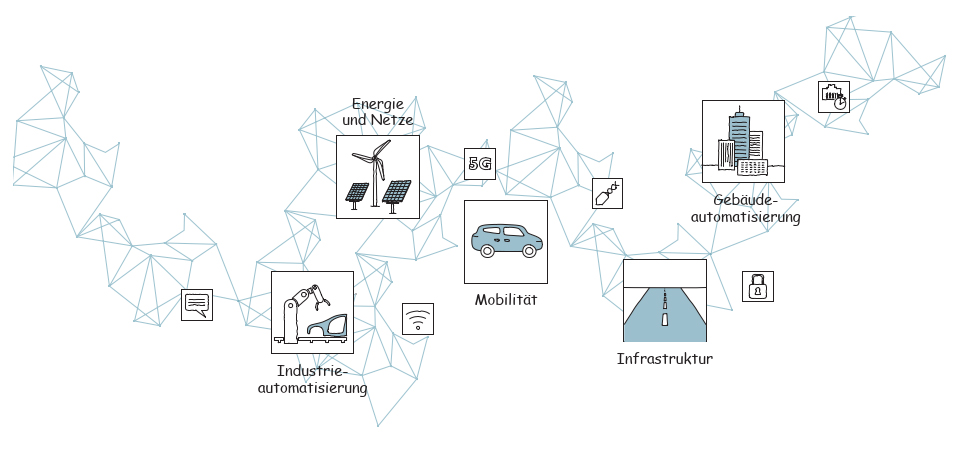
UPDATE: If energy is available in sufficient quantities and its production is completely economical – won’t the issue of energy efficiency become irrelevant again?
It will take quite a lot of time until it is ready. And it is precisely energy efficiency that is a topic with which we can make a significant contribution today to the conservation of resources and also to the implementation of the All Electric Society. And this will remain the case and will continue to set technological standards in the future.
But yes, once the All Electric Society has become a reality, the consumption of energy will no longer have such a negative impact. Then mobility will be possible without a guilty conscience – an appealing idea, isn’t it?
UPDATE: What time frame do you expect for the implementation of the All Electric Society?
The Delphi study on the future of energy systems in Germany, Europe and the world forecasts a significant step towards the realization of this vision by 2040. This study is based on the survey of 80 renowned experts and thought leaders from developing, emerging and industrialized countries and their assessment by 350 international experts.
This is not so long in coming. And that gives me, that gives us hope, both in terms of the future prospects for Phoenix Contact and for all of us.

